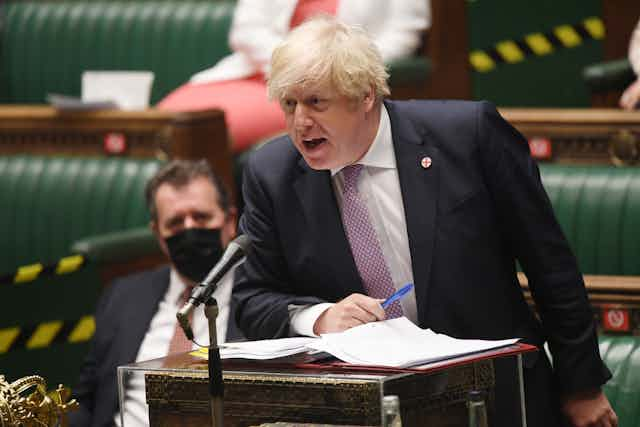The UK prime minister currently chooses his or her ministers from membership of the Houses of Parliament. But a new commission has suggested that the PM should be able to appoint ministers who don’t take seats in the Commons or the Lords.
The recommendations come from a report by the Commission for Smart Government. Set up as a cross-party initiative in 2020, the independent body has been tasked with examining ways in which the machinery of government can be more effective.
The commission argues that giving prime ministers the ability to appoint this new type of minister would allow “talent to be brought in from outside” and so have more specialists within government. The plans have been endorsed by Minister for the Cabinet Office, Michael Gove.
But, if implemented, what would this mean for democratic accountability?
Currently ministers can be called before parliament (either the House of Lords or House of Commons) to be questioned within the chamber about what is going on in their departments, actions that might be controversial, or problems that are being reported in the news. But parliament would not have the power to call in one of these new types of ministers to appear in the chambers of the houses at minister’s questions. This matters as it weakens the lines of accountability between parliament and government.
The proposed new route for appointing ministers raises concern on two fronts:
First, it is ingrained within our current system that the legislature (parliament) holds the government to account for its policies and decision making (via a system of checks and balances).

Having non-parliamentarian ministers would weaken the mechanisms available to MPs to hold the government to account and create distance between government and parliament. It has the potential to reduce the number of opportunities for shadow ministers and other MPs to question those minister’s policies, while also undermining the function of debates scheduled by the opposition, because non-parliamentarian ministers would presumably not be able to participate.
Foreseeing inevitable questions of accountability to the UK parliament, the commission report has suggested the creation of oral committees that can summon these appointees. No one knows, as of yet, what form these committees will take.
Second, this could be a way for the PM to wield too much arbitrary power, where he or she can appoint their contacts from outside parliament to high status positions.
Presidential style ambitions?
Moving towards external appointments is something akin to a hybrid-presidential system (which the UK does not currently have the infrastructure safeguards in place to support).
For example, in the US, once the president is elected, he or she is able to nominate non-politicians, such as academics or business leaders, to serve in their cabinet. Those proposed for appointment as a secretary of state “serve at the pleasure of the president”, but are voted upon and given hearings by elected senators. The senate votes whether or not to confirm that individual for cabinet appointment. Importantly, the US cabinet is more of an advisory body to the president. It does not have any collective executive powers.
US cabinet members are also subject to impeachment by the House of Representatives and trial in the Senate for treason, bribery, and other misdemeanours. By contrast, impeachment proceedings are considered obsolete in the UK, although they still exist.
We need to consider whether the proposals give too much discretionary power to the prime minister, and whether others should be involved in the processes, as well as what mechanisms are needed to critique proposed appointees. Thought should also be given as to whether there are certain ministerial posts that must always be held by an elected MP, and whether caps on the number of non-parliamentarian appointments are needed.
Legal background
Perhaps surprisingly, there are few legal restrictions placed upon the PM in deciding the composition and structure of their government. The few that exist include the Ministerial Act 1975, which limits the number of paid ministerial posts to 109, and the House of Commons Disqualification Act 1975, which states that no more than 95 ministers may sit and vote in the Commons. However, there are no equivalent legal restraints on ministerial numbers in the Lords.
In theory, a minister does not have to be a member of the Houses of Parliament but, in practice, constitutional convention (tradition) dictates that they need to be, primarily to ensure accountability to parliament.
To meet these convention requirements, in the past prime ministers have appointed those from outside parliament to a ministerial job by first giving them a place in the House of Lords. This practice was adopted by Gordon Brown when he announced his “government of all the talents” in 2007, and has continued under Boris Johnson’s administration.
Concerns have already been raised about such existing practices, specifically the accountability of these ministers to the Commons. There is a democratic deficit in having unelected, appointed, government ministers sitting in the Lords, whom are beyond the scrutiny of elected MPs in the Commons chamber. To try and address these criticisms, albeit weakly, in 2009, it was agreed to set aside time, once a month, for questioning secretaries of state sitting in the Lords.
Also, since the 1998 appointment of Chief Constable Keith Hellawell to advise the home secretary on anti-drugs policy, the government already makes use of specialists advisers, otherwise known as tsars. The key distinction here is that tsars report directly to ministers with membership of the Houses of Parliament. Therefore ministers answer questions about the tsars’ work or behaviour in parliament. If these proposals are seen as an alternative route for bringing in specialists, they have the potential to circumvent these direct lines of accountability.
In their current form, the proposals could undermine the democratic function of what happens within parliament. Instead, attention should be given to strengthening the means by which ministers sitting in the Lords and tsars are held to account, while safeguarding already fragile UK democratic accountability processes.

